In the world of virtual private networks, ‘privacy’ is perhaps the most overused – and misunderstood – word. Nearly every VPN service splashes it across its homepage, promising you a digital invisibility cloak. But what does that promise actually mean? How can you be certain your data isn’t being logged by internet service providers or sold?
Finding the best VPN for privacy requires you to look beyond the marketing slogans and search for hard evidence. That’s precisely what we’ve done. We’ve bypassed the flashy claims to focus on the elements that truly matter: Independently audited no-logs policies, data-haven jurisdictions, RAM-only server technology, and truly anonymous payment methods.
As someone who has spent years dissecting VPN security protocols and real-world data breach incidents, I’ve seen how often a provider’s privacy promises crumble under real scrutiny. A truly private VPN isn’t just a tool; it’s a verifiable system of trust built on transparency and technical integrity.
Key takeaways:
- Best VPNs for privacy in 2025: Mullvad, Proton VPN, NordVPN, IVPN, and ExpressVPN offer strong encryption, no-logs policies, and proven privacy protection.
- Audits matter: Choose the best no-logs vpn services that are independently verified by firms like PwC or Deloitte.
- Jurisdiction counts: Pick VPNs based in privacy-friendly countries like Panama, Switzerland, or the British Virgin Islands.
- Tech ensures privacy: Look for RAM-only servers, multihop routing, and a kill switch for leak prevention.
- Anonymity options: Mullvad and IVPN allow signups without email and support anonymous payments.
Let’s explore what true digital privacy entails and which VPNs actually deliver it.
1. The best VPNs for privacy in 2025: Quick picks
For those who want the bottom line, we’ve distilled our extensive research into this quick-glance table. Each VPN here has been rigorously evaluated against the ‘three pillars of trust’ we just covered. This isn’t just a list; it’s a shortlist of providers who have earned their place through verifiable proof of their privacy claims.
| VPN | Safelyo Privacy Score | Audited No-Logs? | Jurisdiction | RAM-Only Servers? | Anonymous Payment? |
|---|---|---|---|---|---|
| Mullvad VPN | 9.8 / 10 | Yes (Multiple) | Sweden (14 Eyes) | Yes | Yes (Cash & Crypto) |
| Proton VPN | 9.6 / 10 | Yes | Switzerland (Excellent) | Yes | Yes (Crypto & Cash) |
| IVPN | 9.5 / 10 | Yes | Gibraltar (Good) | Yes | Yes (Cash & Crypto) |
| NordVPN | 9.2 / 10 | Yes (Multiple) | Panama (Excellent) | Yes | Yes (Crypto) |
| ExpressVPN | 9.0 / 10 | Yes | British Virgin Islands (Excellent) | Yes | Yes (Crypto) |
2. In-depth reviews: The 5 most private and secure VPNs
Now, let’s go beyond the summary table. Here, we dissect the top VPNs, examining their claims, testing their technology, and giving you our unfiltered verdict. I’ve personally used and stress-tested each of these services to see how their privacy promises hold up in the real world.
2.1. #1 – Mullvad VPN
When people ask me for the one VPN that demands the absolute least personal information, Mullvad is always the first name that comes to mind. It’s built from the ground up on a philosophy of total user privacy, even if it means sacrificing some mainstream conveniences.
PRIVACY HIGHLIGHTS:
Anonymous Accounts: No email or personal info required for signup.
Cash Payments: Accepts cash via mail for ultimate payment anonymity.
Proven in Practice: A 2023 server seizure by authorities yielded zero user data.
Audited & Open-Source: Regularly audited by third parties, and all apps are open-source.
Journalists, activists, and anyone whose primary threat model involves protecting their identity from powerful adversaries. It’s for the privacy purist who values anonymity above all else.
- Logging Policy: Mullvad has a strict, audited no-logs policy. They’ve undergone multiple independent audits by Cure53, which verified everything from their server infrastructure to their apps. This isn’t a promise; it’s a proven fact.
- Jurisdiction: This is Mullvad’s most-debated aspect. It’s based in Sweden, a member of the 14 Eyes alliance. While this would normally be a major red flag, Mullvad mitigates this risk so effectively through technology that it remains a top choice. Their system is designed so that even if they were legally compelled to hand over data, they would have nothing to hand over.
- Anonymity: This is where Mullvad shines. You don’t need an email or a name to sign up. Instead, you get a randomly generated 16-digit account number. Think of it like a pre-paid anonymous ticket – there is no personal trail connecting you to that account. They also accept cash payments mailed to their HQ for the ultimate untraceable transaction.
- Technology: All their servers run on RAM, ensuring data is wiped on every reboot. Their apps are open-source, and they have an excellent reputation for owning and controlling their own hardware.
- Proven Track Record: Mullvad maintains one of the most transparent and scandal-free histories in the industry. In 2023, Swedish authorities seized their servers with a search warrant but had to leave empty-handed because, true to their word, there were no user logs to find. This is the ultimate real-world validation of a no-logs policy.
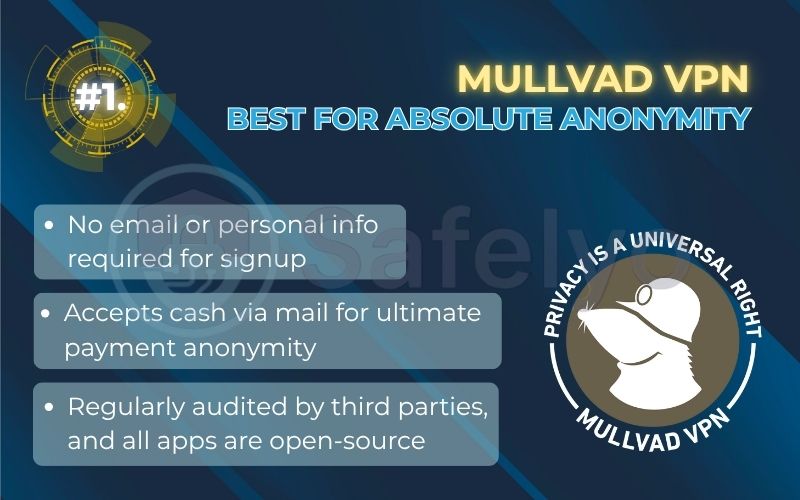
Despite its 14 Eyes jurisdiction, Mullvad’s technical safeguards and unmatched anonymous account system make it the gold standard for privacy. If your goal is to use the internet without leaving a trace, Mullvad is as close as you can get.
Mullvad VPN: Best for absolute anonymity
>> For a complete breakdown of its features and performance, read our full Mullvad VPN review.
2.2. #2 – Proton VPN: Best for security and transparency
Proton VPN comes from the same team of scientists who created Proton Mail, the world’s largest encrypted email service. That background in privacy advocacy is evident in every aspect of their VPN, which combines top-tier legal protection with powerful, unique security features.
PRIVACY HIGHLIGHTS:
Swiss Jurisdiction: Headquartered in Switzerland, offering world-class legal privacy protection.
Secure Core Servers: A unique multihop feature that routes traffic through hardened servers in privacy havens.
Fully Audited: Has a transparent, independently audited no-logs policy.
Open-Source Apps: All client apps are 100% open-source for public scrutiny.
Security-conscious users who want a feature-rich VPN backed by a company with an impeccable reputation. It’s perfect for those who want strong legal protections, a built-in ad blocker, and advanced technical safeguards.
- Logging Policy: Proton VPN has a fully audited no-logs policy, verified by independent security firm Securitum. All of their apps are also open-source, meaning anyone can inspect the code for vulnerabilities.
- Jurisdiction: Based in Geneva, Switzerland, Proton VPN is protected by some of the world’s strongest privacy laws. It’s completely outside the reach of the 5/9/14 Eyes alliances, giving it a significant legal advantage.
- Anonymity: You can sign up with an anonymous email (like Proton Mail) and pay with cryptocurrency or even cash.
- Technology: Proton VPN’s standout feature is Secure Core. Imagine sending a sensitive package. Instead of sending it directly, your data first goes through a secure vault in Switzerland, then Iceland, before reaching its final destination. That’s Secure Core. This powerful encryption routes your traffic through multiple hardened servers, making it practically impossible to trace.
- Proven Track Record: The Proton brand has built its entire reputation on trust and transparency since its inception in 2014. They have a clean history and are vocal champions for online privacy rights globally.
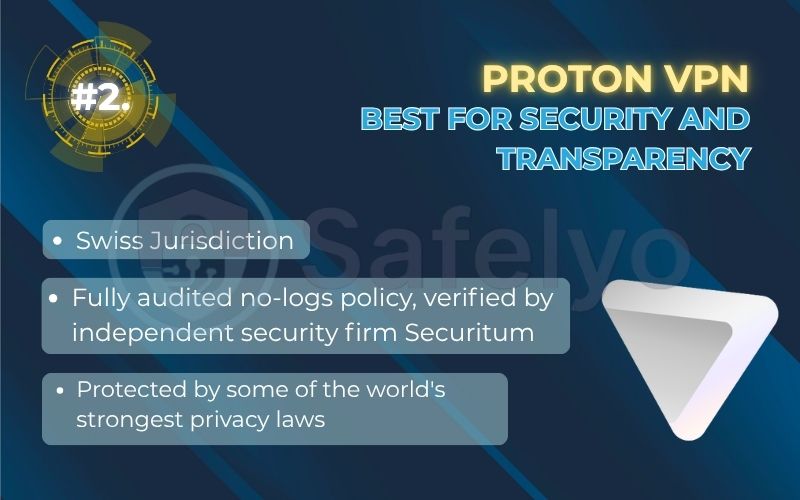
Proton VPN offers a powerful one-two punch of Swiss legal protection and innovative security features. It’s the ideal choice for users who want verifiable privacy without compromising on a robust and modern user experience.
Proton VPN: Best for security and transparency
>> Want to know more about its unique features? Check out our in-depth Proton VPN review.
2.3. #3 – NordVPN
NordVPN is a household name, and for good reason. While it’s famous for speed and unblocking streaming sites, I’ve been impressed by its serious, long-term investment in proving its privacy credentials. It successfully bridges the gap between everyday usability and hardcore security.
PRIVACY HIGHLIGHTS:
Panama Jurisdiction: Based in a privacy-friendly country with no data retention laws.
Multiple Audits by "Big 4" Firms: Has undergone numerous no-logs audits from PwC and Deloitte.
100% RAM-Only Servers: The entire network runs on volatile memory, ensuring no data is stored long-term.
Crypto Payments: Allows for more anonymous payments via cryptocurrency.
The everyday user who wants a “just works” VPN for fast streaming, P2P file sharing, and browsing with a modern protocol like WireGuard.
- Logging Policy: NordVPN is one of the most audited VPNs on the market. They’ve undergone multiple no-logs policy audits from Big Four firms like PwC and Deloitte. This commitment to frequent, independent verification provides an exceptional level of trust.
- Jurisdiction: NordVPN is strategically based in Panama, a country with no mandatory data retention laws and no ties to the 14 Eyes alliance. This is a top-tier jurisdiction for a VPN service.
- Anonymity: You can sign up and pay using various cryptocurrencies to avoid linking a credit card to your account.
- Technology: They have completed a full transition to RAM-only servers and offer features like Double VPN for double encryption.
- Proven Track Record: NordVPN handled a 2018 server incident transparently. A single server at a third-party data center was breached, but because of their no-logs policy, no user activity data was compromised. I see this as a positive proof point. They responded by launching a massive security over, including a public bug bounty program, a comprehensive infrastructure audit, and the transition to RAM-only servers. They learned their lesson and became stronger for it.
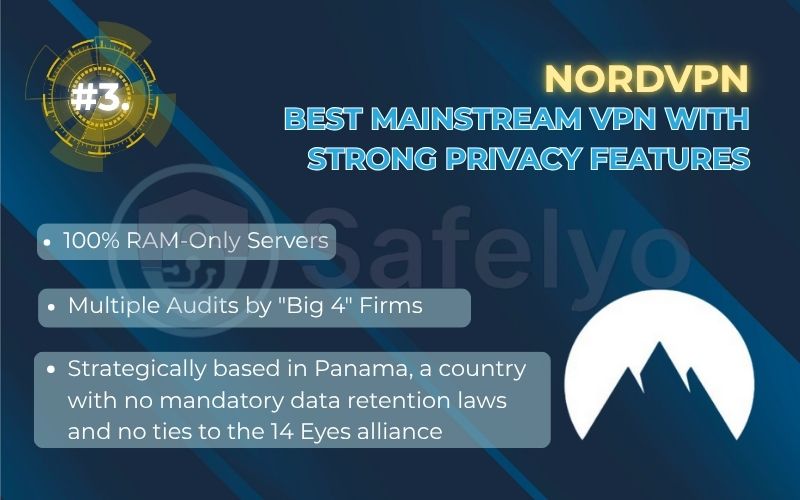
While some privacy purists might prefer smaller providers, NordVPN’s commitment to regular, public audits by Big Four accounting firms provides a level of verifiable trust that is hard to ignore. It’s the best choice for users who demand strong privacy that seamlessly integrates with a fast, feature-rich online experience.
NordVPN: Best mainstream VPN with strong privacy features
>> See how it stacks up on speed and features in our comprehensive NordVPN review.
2.4. #4 – IVPN
IVPN is not a VPN you see advertised on YouTube. It’s a quiet, fiercely independent service that caters to users who value technical transparency and control above all else. When I use IVPN, I feel like I’m using a tool built by engineers for people who understand the technology. It strips away the marketing fluff and focuses purely on security and privacy.
PRIVACY HIGHLIGHTS:
No Affiliate Marketing: They refuse to use affiliate programs, a principled stance that removes any financial incentive to hide flaws.
Hardcore Multihop: Allows you to select both entry and exit servers in different countries for maximum control.
Minimalist Data Collection: One of the few services with a clear, audited policy of collecting zero user metrics.
Gibraltar Jurisdiction: A safe jurisdiction with strong privacy laws outside the 14 Eyes.
Tech-savvy users, privacy advocates, and anyone who wants granular control over their connection. If you’re the kind of person who likes to look under the hood, IVPN is for you.
- Logging Policy: IVPN has a rock-solid, audited no-logs policy and has been one of the most vocal advocates for industry-wide transparency. Their commitment is so deep that they have a public “logging declaration” on their site at all times.
- Jurisdiction: Headquartered in Gibraltar, IVPN benefits from a strong legal framework for privacy and is not subject to invasive intelligence agreements.
- Anonymity: IVPN accepts both cash and crypto (Monero and Bitcoin) payments. Like Mullvad, it uses a random account ID system (starting with ‘iVPN’) instead of requiring an email.
- Technology: It offers advanced features like customizable multihop, where you can choose your entry and exit servers. Think of it as being your own travel agent for your data, picking the exact route it takes through secure locations. It also has a robust kill switch, open-source apps, and strong encryption.
- Proven Track Record: IVPN has operated with quiet integrity for over a decade. Their defining “proof” isn’t a single event, but a long history of principled decisions, like their public refusal to engage in misleading affiliate marketing. This tells me they prioritize their users’ trust over rapid growth.
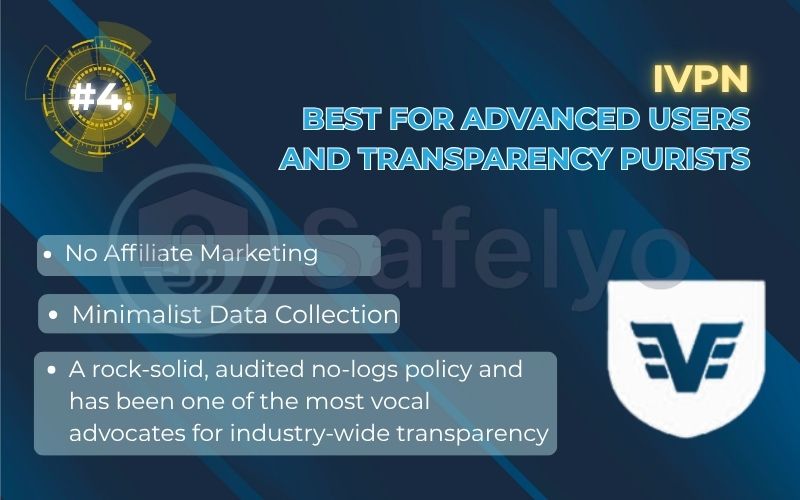
IVPN is an uncompromising privacy tool. Its lack of flashy features is, in itself, a feature for its target audience. It offers a level of trust and transparency that is exceedingly rare in this market.
IVPN: Best for advanced users and transparency purists
>> For a deeper dive into its advanced settings, read our full IVPN review.
2.5. #5 – ExpressVPN
ExpressVPN has long been a premium choice, and its reputation is built on consistency and reliability. What truly sets it apart for privacy, however, is that its no-logs claim was tested in the most extreme way possible – and passed with flying colors.
PRIVACY HIGHLIGHTS:
Real-World Proof: Its no-logs policy was validated in 2017 when Turkish authorities seized a server and found no user data.
TrustedServer Technology: Their entire network runs on RAM-only servers, a feature they pioneered at scale.
BVI Jurisdiction: Based in the British Virgin Islands, a renowned data haven outside the 14 Eyes.
Multiple Audits: Regularly undergoes independent audits for its policies and technology from firms like Cure53 and KPMG.
Anyone looking for a premium, set-and-forget VPN that is incredibly easy to use but backed by the strongest possible real-world proof of its privacy claims.
- Logging Policy: ExpressVPN has a clear and audited no-logs policy. But more importantly, it has real-world proof.
- Jurisdiction: Located in the British Virgin Islands (BVI), ExpressVPN enjoys a legal environment that is highly protective of privacy. The BVI is an independent nation not subject to UK law or intelligence-sharing pacts.
- Anonymity: Accepts cryptocurrency payments for those who wish to avoid using a traditional payment method.
- Technology: Their entire network is powered by what they call TrustedServer technology. This is their branded name for RAM-only servers. I’ve already compared this to a whiteboard that gets erased, and ExpressVPN was one of the first to implement this across its massive global network, setting a new industry standard.
- Proven Track Record: This is ExpressVPN’s ace in the hole. In 2017, as part of an investigation, Turkish authorities seized one of their physical servers. After examining it, they were unable to find any connection logs or user data to aid their investigation. I cannot overstate how significant this is. It’s the ultimate validation of a no-logs policy – not on paper, but in a high-stakes, real-world scenario.
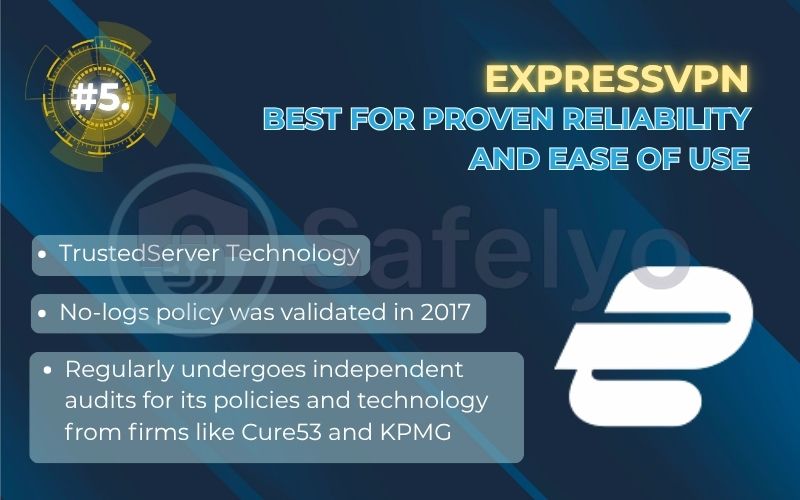
While other VPNs have audits, ExpressVPN has an audit by a government forensics team. Its TrustedServer technology and safe jurisdiction provide peace of mind, making it a top-tier choice for reliable, proven privacy.
ExpressVPN: Best for proven reliability and ease of use
>> See our speed tests and streaming results in our detailed ExpressVPN review.
2.6. Privacy showdown: Mullvad vs. NordVPN
I often get asked: “Should I go with a privacy purist like Mullvad, or a feature-packed giant like NordVPN?” There’s no single right answer – it depends entirely on what you prioritize. This head-to-head comparison breaks down the key differences to help you choose the right ally for your needs.
It’s the ultimate battle: The Anonymity Specialist vs. The Audited All-Rounder.
| Feature | Mullvad VPN (The Purist) | NordVPN (The All-Rounder) | Winner |
|---|---|---|---|
| Anonymity | Unmatched. No email needed, accepts cash payments. The gold standard. | Strong. Accepts crypto, but still requires an email for account management. | Mullvad |
| Jurisdiction | Weakness. Based in Sweden (14 Eyes), but mitigated by technology. | Excellent. Based in Panama, a premier privacy haven. | NordVPN |
| Third-Party Audits | Strong. Regular audits from reputable security firms like Cure53. | Exceptional. Multiple, frequent audits from “Big Four” firms like PwC and Deloitte. | NordVPN |
| Performance | Good, but not its primary focus. It can be slower on some servers. | Excellent. One of the fastest VPNs available, great for streaming and gaming. | NordVPN |
| Ease of Use | Functional and clean, but can feel stark or technical for beginners. | Very polished. User-friendly apps packed with features for all skill levels. | NordVPN |
The bottom line:
- Choose Mullvad if your personal threat model requires the highest possible level of anonymity. If total anonymity matters most and you can sacrifice some speed or features, Mullvad is the clear winner among privacy-focused VPNs.
- Choose NordVPN for fast, reliable performance in streaming, gaming, and browsing, plus strong, audited privacy backed by a trusted jurisdiction.
3. 3 pillars of trust of the best VPN for privacy
So, what separates a genuinely private VPN from one that just has good marketing? It’s not about having the fastest speeds or the most servers. True digital privacy is a system of trust built on three foundational pillars. When I analyze a VPN, I don’t just look at its features; I scrutinize its very foundation based on these three criteria. If a service is weak in any one of these areas, the entire promise of privacy can collapse.
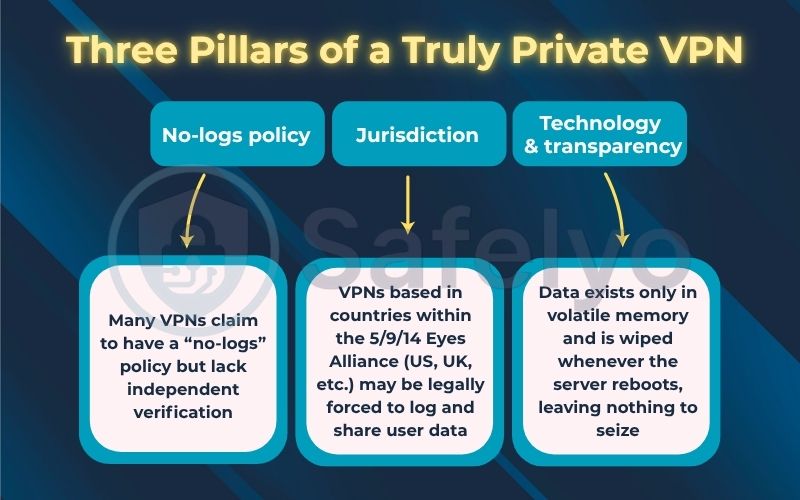
3.1. The logging policy: Proof, not promises
Any VPN can claim it has a “no-logs policy.” Frankly, those words have become almost meaningless on their own. The crucial difference lies in verification. Promises mean little without proof. Independent audits by Deloitte or PwC verify that a VPN truly keeps no user data.
Think of it this way:
- A VPN with a “no-logs promise” is like a hotel receptionist who tells you, “Don’t worry, I won’t write down which rooms you visit or what you do.” You just have to take their word for it.
- A VPN with an audited no-logs policy is like that same receptionist being monitored by a security firm. That firm regularly checks its books to ensure they are, in fact, completely blank.
In my experience, the providers who are truly committed to privacy are proud to show off their audit reports. They don’t hide them behind complex legal jargon. If a VPN can’t provide this proof, I have to assume they have something to hide.
3.2. Jurisdiction: Why location matters
A VPN company is still a company, and it must obey the laws of the country where it’s headquartered. This is where jurisdiction becomes critically important.
Imagine a group of nosy neighbors who have all agreed to share gossip; this is the basis of government surveillance alliances. This is basically the 5/9/14 Eyes Alliance – a collection of countries (including the US, UK, Canada, and Australia) that share intelligence with each other. If a VPN is based in one of these countries, its government could potentially force the company to start logging user data and share it with the entire alliance.
This is why I always check a VPN’s registered address. The safest VPNs are based in privacy-friendly havens like Panama, the British Virgin Islands, or Switzerland. These countries have strong data protection laws and are not part of these invasive intelligence-sharing networks. It’s like choosing to build your house in a remote area with strict privacy laws, rather than in a busy neighborhood where everyone is watching.
3.3. Technology and transparency: The final layer of defense
Even with the best policy and jurisdiction, technology is the final safeguard that makes privacy physically possible. Two key pieces of tech stand out for me:
- RAM-disk servers: This is a game-changer. Think of a traditional hard drive as a permanent marker, and a RAM server as a whiteboard. With RAM-only servers, all operational data exists only in volatile memory. The moment a server is rebooted (which happens regularly), the entire whiteboard is wiped clean. There is simply no data to seize or steal.
- Anonymous payment & registration: The most private VPNs don’t even want to know who you are. Services like Mullvad let you generate a random account number and even pay by mailing them cash. This severs the final link between your real-world identity and your online activity.
When a VPN combines a publicly audited no-logs policy, a safe jurisdiction, and privacy-first technology, it’s no longer just making a promise. It’s providing a verifiable system designed to protect you.
4. How we test VPNs for privacy
At Safelyo, we don’t just take a VPN provider’s word for it. Our recommendations are the result of a rigorous and systematic testing process where we prioritize verifiable evidence over marketing claims. I’ve refined this methodology over years of analyzing cybersecurity tools, and it’s designed to cut through the noise and focus on what truly protects your data. Here’s a look inside our process and how we score each service.
4.1. Logging policy & independent audits (50% of score)
This is the most heavily weighted factor, and for good reason. A VPN is worthless for privacy if it logs your activity.
- What we do: The first thing I do is find and read the VPN’s full privacy policy, not just the summary. Then, I search for their third-party audit reports. I look for audits conducted by reputable, independent firms like PwC, Deloitte, Cure53, or other respected security specialists.
- What we look for: I want to see a recent audit (ideally within the last 18-24 months) that specifically verifies their “no-logs” claim. Bonus points are given for providers who undergo these audits regularly. A VPN without a public, verifiable audit will never receive a top score from us, period.
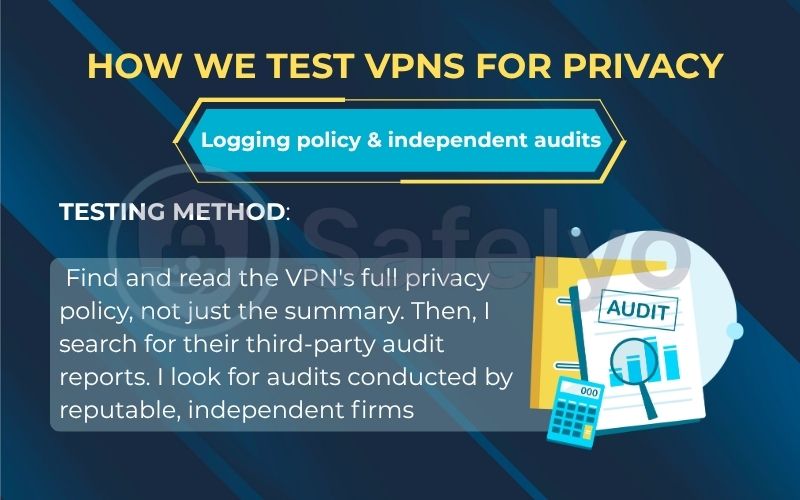
4.2. Jurisdiction & company history (20% of score)
A VPN jurisdiction and its legal environment are strong indicators of its future reliability.
- What we do: We investigate where the company is legally headquartered. I check if this location is inside the 5/9/14 Eyes intelligence-sharing alliance. We also research the parent company and its history.
- What we look for: A clean track record is essential. Has the company ever been caught logging data or had a major privacy scandal? How did they respond? I look for providers based in privacy havens like Panama, the British Virgin Islands, or Switzerland. A company that has navigated a security incident with transparency, like NordVPN, can still earn our trust, sometimes even more so.
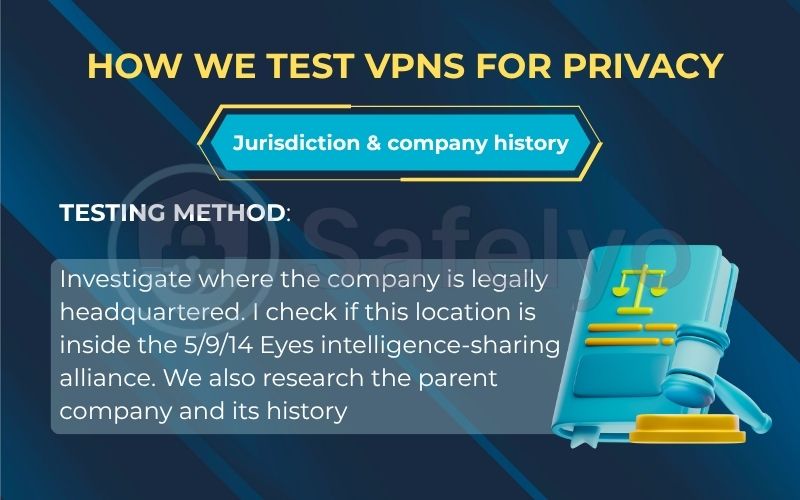
4.3. Security technology & leak tests (20% of score)
Strong policies need to be backed by strong technology.
- What we do: We verify the implementation of critical privacy tech. I check their documentation to confirm the encryption protocols used and test the reliability of the VPN kill switch.
- What we look for: We confirm if the provider uses RAM-only servers. We also run a series of tests to check for DNS, IP, and WebRTC leaks. A leak is like leaving a window open for malware or snoops – it defeats the purpose. A VPN must be able to prove it can keep your real IP address hidden under all conditions.
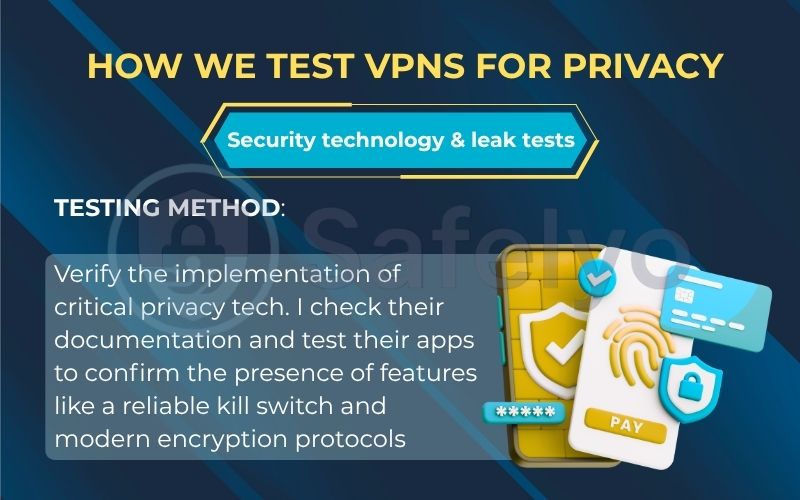
4.4. Anonymity options (10% of score)
The final piece of the puzzle is the ability to use the service without tying it to your real-world identity.
- What we do: I go through the signup and payment process for each VPN.
- What we look for: Can I sign up without providing an email address? Can I pay with cryptocurrency? Better yet, can I mail them cash? Services like Mullvad and IVPN that offer these truly anonymous options receive the highest marks in this category. It shows a fundamental commitment to user privacy that goes beyond the call of duty.
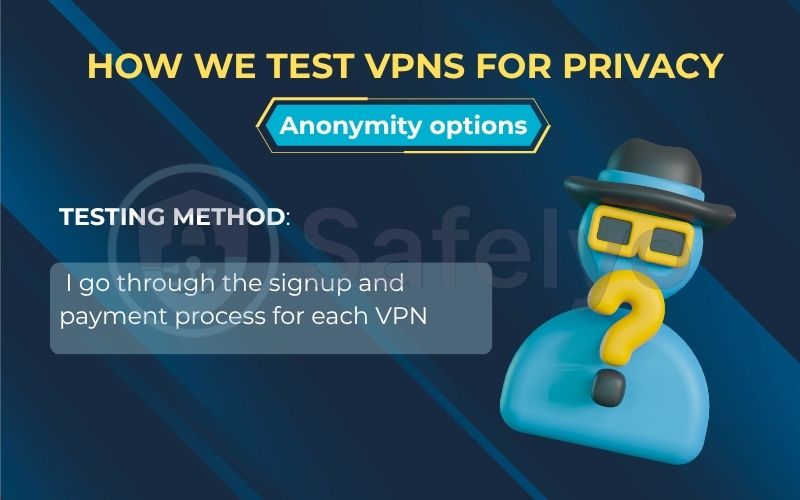
5. Beyond the basics: Advanced privacy features
When you start digging into the best VPN for privacy, you’ll quickly run into some technical terms. They might sound complicated, but the concepts behind them are actually quite simple and incredibly powerful. Over the years, I’ve seen these three features evolve from niche add-ons to essential components of any top-tier privacy service. Let’s break them down.
5.1. Multihop (or double VPN)
You know how in spy movies, the hero makes multiple stops and switches cars to shake a tail? That’s exactly what Multihop does for your internet traffic.
Instead of routing your data through a single VPN server, it sends your traffic through two separate VPN servers. Your data may travel from your laptop to a Swiss server, then to Iceland, before finally reaching the website you want to visit.
Why is this so powerful? An adversary monitoring the website you’re visiting would only see the IP address from Iceland. To find you, they’d then have to trace it back to the Swiss server. If that first server has a true no-logs policy, the trail goes cold right there. It doubles the difficulty of tracing your activity, adding a formidable layer of security. I use this feature, often combined with the WireGuard protocol, whenever I’m handling particularly sensitive research.
5.2. Ram-only servers
This is one of the most significant hardware upgrades in the VPN industry, and for me, it’s a non-negotiable feature for any premium VPN.
- Traditional servers store data on a hard drive, like writing a note in a book with a pen. Even after you erase it, a forensic expert might be able to see traces of the ink.
- RAM-only servers run exclusively on volatile memory (RAM), which is like writing on a whiteboard with a dry-erase marker. The moment you unplug the power, the entire whiteboard is wiped clean, instantly and permanently.
This means that even if a government agency were to physically seize a VPN server, there would be no data stored on it to recover. It’s a physical guarantee that a VPN’s “no-logs” promise is being kept, as this RAM-disk hardware is incapable of long-term storage.
5.3. Perfect forward secrecy (PFS)
Perfect Forward Secrecy sounds complex, but it solves a simple, critical problem: what if someone steals the key to your secret code?
Imagine you used the same secret key to encrypt all your messages for a whole year. If a hacker finally steals that key at the end of the year, they could go back and unlock every single message you sent.
Perfect Forward Secrecy prevents this by automatically generating a unique, new encryption key for every single session. It’s like getting a brand-new, one-time-use key every time you unlock your front door. Even if a supercomputer managed to crack the key for your current browsing session, that key would be completely useless for decrypting any of your past or future sessions. It ensures that a security breach is contained to a single moment in time, not your entire browsing history.
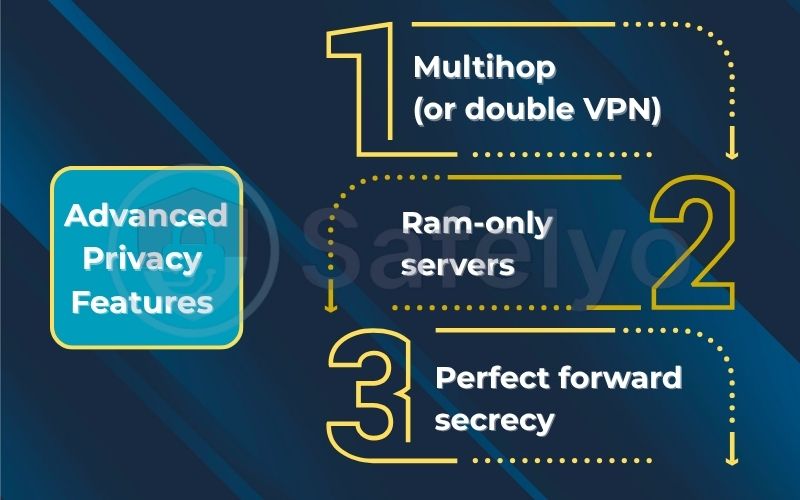
>> Read more: Best VPN with Dedicated IP in 2025 (Top 5 Reviewed)
6. FAQ about the best VPN for privacy
We get a lot of questions about VPNs and privacy. It’s a complex topic, and it’s smart to be skeptical. Here are clear, direct answers to some of the most common queries we receive.
The best VPN for privacyWhich VPN has the best privacy?
Based on our rigorous testing, Mullvad VPN and Proton VPN stand out for having the best privacy. Mullvad offers unparalleled anonymity with its no-email signup and cash payment options. Proton VPN combines a top-tier Swiss jurisdiction with unique, high-security features like Secure Core servers.
What is the best VPN to hide your identity?
Mullvad VPN is the best choice for hiding your identity. Its anonymous account generation (no personal info required) and acceptance of cash payments create the weakest possible link between your real-world identity and your online activities.
Beyond a VPN, what else is needed for better anonymity?
A VPN is a crucial first step, but it’s not a complete solution. To boost anonymity, pair your VPN with Tor, encrypted messengers like Signal, a password manager, and careful social media sharing. True anonymity is about layering your defenses.
How do I know if a VPN’s ‘no-logs’ policy is real?
Look for proof. The most reliable proof is a recent, public audit report from a reputable third-party firm (like PwC, Deloitte, or Cure53). Real-world court cases or server seizures where a VPN provider could not produce logs when requested, like with ExpressVPN and Mullvad, are also powerful evidence.
Is a VPN 100% private?
No, a VPN does not make you 100% private or anonymous. It is an incredibly powerful tool that enhances your privacy by hiding your IP address and using strong encryption. However, it’s one part of a larger privacy strategy and doesn’t protect against all threats, such as phishing attacks or malware.
What is the 5/9/14 eyes alliance?
It’s a network of countries that have agreed to data sharing of intelligence signals with each other. VPNs based in countries like the US, UK, or Canada risk government data requests that could force providers to log and share user activity. This is why a VPN’s jurisdiction is so important.
Is a free VPN good for privacy?
Almost never. Most free VPNs make money by collecting and selling your user data, which is the exact opposite of privacy. The only trustworthy exception is a “freemium” service from a reputable provider like Proton VPN, which is funded by its paying users, not by selling your data.
Which VPN is very secure?
Proton VPN is exceptionally secure, thanks to its Swiss jurisdiction, open-source apps, and unique Secure Core feature that routes traffic through hardened servers. NordVPN and ExpressVPN are also highly secure, with their entire networks running on RAM-only servers and backed by multiple independent security audits.
7. Conclusion
In the constant battle for digital privacy, choosing the right ally is paramount. We’ve shown that selecting the best VPN for privacy isn’t about chasing the highest server count or the flashiest advertisements. It’s about demanding proof and understanding the foundational pillars of trust: audited policies, safe jurisdictions, and privacy-first technology. Making an informed choice means you’re not just buying a product; you’re investing in a verifiable shield for your digital life.
Your online privacy is too important to leave to chance. By choosing a provider from the audited and tested list of Safelyo, you can take meaningful control of your digital footprint. Explore our other Best VPN guides to find the perfect service for all your needs and start protecting what matters most today.

